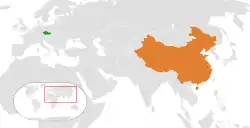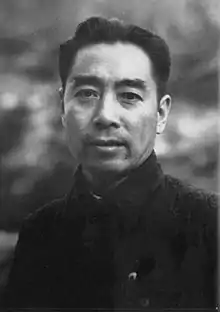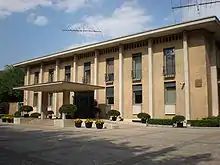China–Czech Republic relations
China–Czech Republic relations or Sino–Czech relations are international relations between China and the Czech Republic. There were official relations by 1919 and formally established relations followed on 6 October 1949 between Czechoslovakia and China.[1][2] In 1993, the Czech Republic was established and inherited the Czechoslovak treaty. The relations, trade and tourism between the China and the Czech Republic improved rapidly since the 1990s; and in the 2010s, agreements were made for more thorough economic improvements. Recently, relations have deteriorated due to major Czech politicians visiting Taiwan.
 | |
Czech Republic |
China |
|---|---|
History
1919–1948
In 1919, the newly established Republic of Czechoslovakia was recognized by China.[3] On 10 September 1919, Lou Tseng-Tsiang, a member of the Chinese delegation attending the Paris peace conference, wrote a letter to Milan Hodža, suggesting the play La voile du Bonheur, set in ancient China and written by the Sinophile French politician Georges Clemenceau be translated into Czech.[4] Writing in French, Lou declared :"je crois qu'elle pourra aussi intéresser les lecteurs de votre pays".[4] Czech scholars tended to be more interested in Chinese culture than the other around.[4] By contrast, Chinese scholars tended to be more interested in German culture with one scholar Yu Ta-wei saying of universities in the Weimar Republic: "there were scientists of the calibre of Albert Einstein, Max Plank and Ulrich von Willamowitz-Möllendorf teaching at German universities-what other country could boast intellectual resources of that calibre?"[5] Only after a wave of assaults perpetuated by the SA in 1933 against Chinese university students studying in Germany did those Chinese wishing to study abroad began to consider universities outside of Germany. The low importance assigned by the Waichiaopu to relations with Prague was shown by the fact that Chinese minister in Warsaw was also the minister to Prague and rarely left Warsaw to meet Czechoslovak politicians.[3] Following a corruption scandal in 1933 involving the Chinese minister in Warsaw, Chang Hsin-hai, whom it was discovered had accepted bribes to sign fake invoices for arms shipments from Czechoslovakia that actually went to Spanish Morocco instead of China, Liang Lone was appointed Chinese minister in Prague.[3]
The appointment of a minister in Prague improved Czechoslovak-Chinese relations, and in the 1930s China began to purchase industrial equipment and arms to modernize China, especially its armed forces.[3] In the 1930s, China had 17 diplomatic missions in Europe by 1936 with embassies established in Paris, London, Moscow, Berlin and Rome.[4] By contrast, China maintained legations in Lisbon, Warsaw, Vienna and Prague as Portugal, Poland, Austria and Czechoslovakia, respectively, were considered only secondary powers.[4] The fact that none of those nations where China maintained relations at a legation level had extraterritorial rights led the Chinese to attach some importance to relations with those states as it allowed them to show the rest of the world that extraterritorial rights were not necessary to have a good relationship with China.[4] The Chinese diplomats in Europe in the 1930s formed a closely knit group of friends, all of whom had attended foreign universities to study international law and foreign languages, who met on a regular basis to discuss the problems of Europe and Asia.[6] Liang often left Prague to go to Berlin, Paris, London and Geneva (where the headquarters of the League of Nations was located) to confer with his fellow Chinese diplomats.[6] Additionally, various Chinese notables such as Madame Chen Suk-ying, the wife of Sun Fo, H. H. Kung and Wang Jingwei regularly visited Prague to see the renowned doctor Wilhelm Nonnenbruch, and would stop by the Chinese Legation.[6] The American historian Liang Hsi-Huey, the son of the diplomat Liang Lone who served as the Chinese minister in Prague, wrote that Wang, one of the most charismatic men in China and the leader of the left-wing of the Kuomintang until he became a Japanese collaborator in 1938, was "...so powerful an orator that after a patriotic speech he gave in our house over dinner, even our Czech servants in the kitchen felt moved, though they had not understood one word".[6]
Liang wrote the differences between Czechoslovakia, a small, economically advanced, highly centralized state in Central Europe with its "disciplined democracy" vs. China, a large, populous and economically backward country whose "people were held together by traditions of loyalty to family and clan rather than through legal obligations to the state" led to very different approaches to international relations.[7] The leaders of Czechoslovakia were obsessed with the fear that their country could be destroyed in a matter of days in a "cataclysmic war" while China "...had over the past 100 years surrendered piece after piece of its territorial sovereignty and still continued to exist".[7] The principle aim of Czechoslovak diplomacy was to build a system of alliances which would deter a potential enemy, especially Germany, from invading while the principle aim of Chinese diplomacy was to secure foreign aid to allow China to modernize and end its treatment as a second class power by the Western nations and Japan.[7] Liang wrote the elites in Czechoslovakia and China had very "different senses of time" with the Czechoslovak leaders thinking in terms of years while the Chinese thought in terms of decades.[7] The virulent anti-Asian racism held by Adolf Hitler and the rest of the Nazi leaders were generally not considered a problem by the Chinese diplomats, who knew Germany was the main source of weapons for China and the military mission training the Chinese Army, which led them to ignore Nazi racism as much as possible.[7] By contrast, the völkische concept of Slavs as untermensch ("subhumans") and Germans as Herrnvolk ("master race") led the Czechoslovak diplomats to see Nazi Germany as an existential and immediate threat.[8]
In 1928, China purchased a hydroelectric power plant from Skoda and in 1933 the machinery for a sugar processing plant, likewise from Skoda.[3] As part of the effort to diversify the sources of arms as the Chinese leader Chiang Kai-shek did not want to become overtly dependent upon Germany (the largest seller of weapons to China until 1938), Chinese officers regularly visited Czechoslovakia on arms buying missions from 1932 onward.[4] In 1932, H. H. Kung, the Chinese Finance Minister, visited Czechoslovakia to inspect the armament factories in Pilsen and Brno.[3] In an attempt to reduce the dependence on Germany as a source of weapons, Liang encouraged Chinese officers to visit Czechoslovakia to buy arms there.[4] The younger Liang remembered when growing up in Prague that his father would take him on walks through Stromovka park talking about the geopolitical implications of changes in power in Eurasia.[9]
The great prestige maintained by Edvard Beneš, who was considered one of the most ablest diplomats in Europe, was often noted by the Chinese.[7] Beneš was a great believer in the League of Nations, arguing that all the nations of the world, regardless if they were great powers or small powers should be treated equally, a message that appealed to Chinese diplomats who were struggling to end the "Unequal Treaties" that gave the citizens of the European great powers extraterritorial rights in China.[7] Beneš's message that all of the nations of the world should band together under the League to resist aggression also had appeal to Chinese diplomats after Japan seized Manchuria in 1931.[7] In practice, however, Beneš who saw the principle of collective security under the banner of League as a way of getting the great powers to defend Czechoslovakia, regarded collective security as only applying to Europe, not Asia.[10] Beneš felt that applying the principle of collective security to the defense of China against Japanese aggression would distract the attention of the great powers from Europe, leaving Czechoslovakia open to German aggression.[6] Czechoslovakia's support for China during the Mukden incident was mostly rhetorical as Beneš deplored the Japanese aggression against China without doing anything more.[6] On the other hand, the fact that Germany was the largest source of arms for China together with the fact that a German military mission was training the National Revolutionary Army led the Chinese government to support the German viewpoint on the Sudetenland until June 1938 when the Reich ceased arm sales to China and withdrew the German military mission.[11] After Germany switched from supporting China to supporting Japan in June 1938, Chinese attitudes towards Czechoslovakia became more favorable. Li Ban, a Chinese officer serving with the Wehrmacht transferred over to the Czechoslovak Army in July 1938, becoming the one and only Asian in the entire Czechoslovak Army.[12] Li left the Wehrmacht out of disgust with Germany's support for Japan, and declared that he would fight with Czechoslovakia if the Reich should invade.[12]
The younger Liang wrote about his father's time as minister in Prague: "...I like to think that the six happy years that Liang Lone-and indeed our whole family-spent in Prague between 1933 and 1939 made for a rapprochement between China and Czechoslovakia that was good for both countries. I cannot speak for Czechoslovakia, but I think I can speak of a growing appreciation for the democratic ideas of President Masaryk and President Beneš on the Chinese side. My father respected Beneš, and ten years later, when I was already a student and Beneš had just died, he spoke to me with affection of his meetings with Czechoslovakia's long-time foreign minister and second president".[13] In a book published in German in Prague in 1938 entitled China muss siegen (China must win), the elder Liang wrote about the process of persecution done in the name of Gleichschaltung (coordination) "such as we see being done in certain undemocratic countries".[14] However, Liang fils wrote about the political attitudes of Liang pere: "...I do not believe that my father shared quite the same abhorrence that Thomas Masaryk and Edvard Beneš felt for Nazi Germany. Like so many Kuomintang politicians of his generation, Liang was still a Confucian at heart, a believer in China's ancient culture, always more inclined to compromise with a Chinese warlord than to become involved with a foreign government. Beneš by contrast, gave high priority to good relations with neighboring countries, hoping that peace would give the minorities in his small republic the time and confidence to join together in one national community".[14]
1949–1988
People's Republic of China–Czech Republic relations began on 6 October 1949 when the Czech Republic was a federal element of Czechoslovakia.[1] In 1960, during the Sino-Soviet split, Czechoslovakia in common with the other Soviet satellite states sided with the Soviet Union.[15] In 1953, two film-makers from Czechoslovakia, Vladimír Sís and his cameraman Josef Vaniš, were sent to Tibet to film a documentary on construction of a highway linking Tibet to the Chinese region of Sichuan.[16] The resulting documentary, Cesta vede do Tibetu (The Road Leads to Tibet) captured many aspects of traditional Tibetan culture together with Buddhist monasteries that were destroyed during the Cultural Revolution.[17]

In 1968, China vehemently condemned the Soviet invasion of Czechoslovakia.[18] On 23 August 1968, the Premier and Foreign Minister Zhou Enlai gave a speech at the Romanian Embassy in Beijing, accusing the Soviet Union of "Fascist politics, great power chauvinism, national egoism, and social-imperialism."[18] Zhou compared the invasion of Czechoslovakia in 1968 with Hitler's policies towards Czechoslovakia in 1938–39 and with American policies in Vietnam.[18] In his speech, Zhou came very close towards urging the Czechs and Slovaks to wage a guerrilla war against the Red Army.[18] Through the Chinese had been opposed to the "Prague Spring" policies of Alexander Dubček, who was accused of being a "revisionist", Mao Zedong was completely opposed to the so-called "Brezhnev Doctrine" under which the Soviet Union gave itself the right to intervene if a Communist country was deviating from Communism as defined by the Soviet Union, which he felt might be applied against himself.[19] After the Soviet invasion, the principle criticism made of Dubček by the Chinese media was that he had "capitulated" instead of waging a guerrilla war as Mao wanted him to do.[20] The fact that the Chinese had condemned Dubček for initiating the Prague Spring reforms intended to create "socialism with a human face" presented some difficulties for Chinese propaganda after the Soviet invasion. As a result, Chinese propaganda tended to focus on the abstract right of peoples to develop socialism as they saw fit for their own nations instead of the particular policies pursued by Dubček.[20] In this regard, Dubček was condemned by the Chinese media for copying the "revisionism" already practiced in the Soviet Union, whom according to the Chinese media had been deviating from proper Communism ever since the death of Stalin in 1953.[20] The Chinese media maintained that it was correct to speak of a "socialist commonwealth" during Stalin's lifetime, but after his death, China under Mao had been remained faithful towards true communism while the Soviet Union and all of the Eastern European states except for Albania had deviated away from proper communism.[20] At various times, the Chinese media compared the Soviet concept of a "Socialist Commonwealth" in Eastern Europe to the Japanese "Greater East Asia Co-Prosperity Sphere", the Nazi "New Order in Europe", and the American "Free World Community".[20] On 26 August and 5 September 1968, the Chinese formally submitted diplomatic of protest against the treatment of Chinese diplomats in Prague by Soviet forces.[21] Relations between Prague and Beijing remained cold until 1987 when the Chinese Prime Minister Zhao Ziyang visited Czechoslovakia on an official visit.[15]
1989–present
The Czech Republic became an independent country on 1 January 1993, the Chinese government extended diplomatic relations.[1] At the dissolution of Czechoslovakia in 1993, government officials from both sides signed and exchanged notes recognizing the treaties and agreements signed between China and the former Czechoslovakia Federal Republic continues to be upheld and binding.[1] Sino-Czech relations were strained under the presidency of Václav Havel who was highly supportive of Chinese dissidents and was a friend of the Dalai Lama.[15]
The bilateral relationship sunk to a low in 1995 as the Czech Republic allowed Lien Chan and other Taiwanese government officials to have a state visit in their country.[1] The Czech Republic also openly supported Two-Chinas and Taiwan's re-entry in the United Nations.[1] In early 1996, relationship between the two countries improved as the Czech Republic under Vaclav Klaus reaffirmed its One China policy.[1]
Miloš Zeman, who served as prime minister of the Czech Republic from 1998 to 2002 and serves as the president since 2013, tried to forge close ties to China.[22] The Czech political representation opened itself up to the Chinese government in 2013–14 for "economic diplomacy".[23] By 2019, this rapprochement has had mixed results including several economic and political controversies.[22][23]

On 20 May 2009, China and Czech Republic celebrated sixty years of diplomatic relations.[24][25] Chinese premier Wen Jiabao met with Czech President Vaclav Klaus and the then Czech Prime Minister Jan Fischer for talks on improving bilateral trade, environment protection and build mutual trust.[24][25]
In October 2014, Czech president Miloš Zeman met Chinese counterpart Xi Jinping in Beijing. Xi expressed he will strive new restart in bilateral relations and Zeman addressed topics on improving business and tourism between the two countries.[26][27] Zeman also proposed direct flight connection between Prague and Shanghai, and establishing new Czech consulate in Chengdu, Sichuan. Later Zeman also met representatives of Bank of China and Prime Minister Li Keqiang.[27]
President Xi Jinping visits the Czech Republic from 28 to 30 March 2016, at the invitation of president Zeman. It is the first visit by a president of the People's Republic of China to the Czech Republic, demonstrating the improving relations between the two countries.[28] A strategic partnership agreement between the two countries has been signed by the presidents.[29]
In 2018 relations were harmed when the Czech cyber-security watchdog warned of the risks associated with purchasing telecom equipment from Chinese companies such as Huawei and ZTE.[30]
Zeman's fifth visit to China took place in April 2019. Talks between Xi and Zeman were largely concerning trade, investment and economic relations.[31] That year, the city of Prague, twinned with Beijing, declared support for Tibet. The decision angered Beijing, which then terminated the agreement; Prague in turn took up with Taipei.[30]
In January 2020 the Chinese ambassador sent a letter to the Czech President protesting the impending trip to Taiwan of Jaroslav Kubera, Speaker of the Senate, as a violation of the one China policy. The futures of Škoda, the Home Credit Group and Klaviry Petrof were threatened if the visit went forward.[32][33] The visit never took place due to Kubera's death.[34] In March 2020 Czech Prime Minister Andrej Babiš demanded China replace its ambassador for the threatening letter.[30]
In August 2020, Miloš Vystrčil, president of the Senate of the Czech Republic led a 90-member delegation to Taiwan. In response, China's Foreign Ministry spokesman called is a "despicable act" and a Chinese diplomat threatened that Miloš Vystrčil would "pay a heavy price".[35][36]
Trade
The economic relations between the countries stood at US$340 million in 1993 when the Czech Republic became an independent state.[1] Over the years, the bilateral trade has increased. In 2001, the trade volume between the two countries was US$615 million.[1]
In 2007, bilateral trade between China and the Czech Republic stood at $9.9 billion.[37] This has increased to 61.9 percent year on year basis.[37] In the same year, Chinese exports to the Czech Republic was $9.2 billion in 2007.[37] China's imports from the Czech Republic totaled $700 million in 2006.[37]
In 2016, Czech export to China was US$1.921 billion (1.19% of total Czech exports) and Chinese export to the Czech Republic was US$17.770 billion (12.66% of total Czech imports).[38]
In 2018, Czech Cyber and Information Security Agency (NUKIB) issued a warning to the Czech National Security Authority that usage of Chinese telecommunications company Huawei's software and hardware equipment posed a security risk.[39] In July 2019, two Czech former employees of Huawei claimed that they were required to collect the personal data of clients including their family information, personal interests and financial situations, which was then entered into Huawei's central databases in China. This information would also be shared with Chinese embassy officials in Czech.[40][41]
In 2020 during the Coronavirus crisis, the Czech Republic imported 150,000 test kits from China at a cost of US$546,000. However, 80% of these were found to be faulty.[42][43]
Diplomatic missions


See also
References
- "Ministry of Foreign Affairs of the People's Republic of China". Mfa.gov.cn. Retrieved 15 August 2018.
- "Mutual relations between the Czech Republic and the People´s Republic of China – present and history".
- Liang 1999, p. 349.
- Liang 1999, p. 350.
- Liang 1999, p. 352.
- Liang 1999, p. 354.
- Liang 1999, p. 351.
- Liang 1999, p. 351-352.
- Liang 1999, p. 345-346.
- Liang 1999, p. 353-354.
- Liang 1999, p. 352-353.
- Liang 1999, p. 363.
- Liang 1999, p. 360.
- Liang 1999, p. 361.
- Lomová, Olga (20 October 2014). "The Czech Republic and the People's Republic of China. "Good old" relations restarted?". VRReview. Retrieved 1 February 2019.
- Fraňková, Ruth (19 February 2019). "Banned 1954 Documentary on Tibet Returns to Cinemas". Radio Praha. Retrieved 1 February 2019.
- Fraňková, Ruth (19 February 2019). "Banned 1954 Documentary on Tibet Returns to Cinemas". Radio Praha. Retrieved 1 February 2019.
- Rea 1975, p. 22.
- Rea 1975, p. 22-23.
- Rea 1975, p. 23.
- Rea 1975, p. 25.
- Prague Opened the Door to Chinese Influence. Now It May Need to Change Course. Foreign Policy. BETHANY ALLEN-EBRAHIMIAN, EMILY TAMKIN. 16 March 2018.
- China’s political interference in Czech Republic back in focus. Agata Palickova. EURACTIV.com. 24 July 2019.
- "Chinese premier's European tour boosts mutal political trust, pragmatic co-op with EU(05/21/09)". china-embassy.org.
- "China's development boosts world peace: Czech official". People's Daily.
- Czech News Agency. Zeman says Taiwan is part of China. The Prague Post. 27 October 2014.
- Competitiveness: President Miloš Zeman visits China Archived 4 December 2014 at the Wayback Machine. The Council on Czech Competitiveness. 26 October 2014
- Czech Republic has so much more than Prague's Old Town Square.Xinhua News Agency. Published on 27 March 2016.
- Jason Hovet and Jan Lopatka. Chinese, Czech presidents forge strategic partnership on Prague visit. Reuters. 29 March 2016.
- Ben Blanchard, Robert Muller and. "Czech prime minister says China's ambassador should be replaced". Reuters. Retrieved 10 March 2020.
- Zeman mluvil s prezidentem Číny. S poradcem Jie Ťien-mingem se nesetkal, ve vězení ale prý není (in Czech). 28 April 2019. ČT24.
- Strong, Matthew. "China sent threatening letter about Czech official's plan to visit Taiwan". Taiwan News. Retrieved 19 February 2020.
- Aspinwall, Nick. "Czech Companies the Latest Target of Chinese Retaliation for Taiwan Ties". thediplomat.com. The Diplomat. Retrieved 23 February 2020.
- Nick Carey, Raphael Satter and. "China threatened to harm Czech companies over Taiwan visit: letter". Reuters. Retrieved 20 February 2020.
- "China warns Czech leaders will pay 'heavy price' for Taiwan visit". DW. 31 August 2020.
- "'Heavy price': China threatens Czech official over Taiwan visit". Al Jazeera. 31 August 2020.
- "China-Czech bilateral trade surges 61.9% in 2007". chinadaily.net.
- "Czech Republic – Exports and Imports – by Country – WITS – Data". World Bank.
- Lopatka, Jan (6 March 2019). "Czech cyber watchdog says its Huawei warning took U.S. by surprise". Reuters.
- McEnchroe, Tom; Janek, Kroupa (22 July 2019). "Former Huawei employees say client information was discussed at Chinese embassy". Radio Prague International.
- Frantisek, Markovic (24 July 2019). "China's Huawei Faces New Allegations Over Cyber Security". Forbes.
- "COVID-19: Chinese companies selling defective test kits abroad". Asia News. 30 March 2020.
- "Chinese company sold sub-standard test kits: Spain, Czech". Economic Times. 28 March 2020.
Further reading
- Liang, Hsi-Huey "China, the Sino-Japanese Conflict and the Munich Crisis" pages 342–369 from The Munich Crisis, 1938 Prelude to World War II edited by Erik Goldstein and Igor Lukes, Frank Cass, London, 1999.
- Rea, Kenneth "Peking and the Brezhnev Doctrine" pages 22–30 from Asian Affairs: An American Review, Volume 3, No. 1. September–October 1975
- Shoiw-Mei Tseng. Trade Flows between Czech Republic and East Asia (PFD full text). January 2013.
External links
- Czech Embassy , China (in Czech)
- Embassy of the People's Republic of China in the Czech (in Chinese and Czech)
.svg.png.webp)
